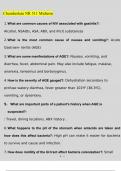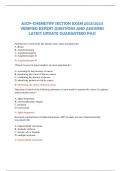Essay
IB SL/HL History Paper 2: Compare & Contrast the causes of two world war crises from two different regions'
- Institution
- OCR
This document provides a detailed essay based on the IB HL History Paper 2 question 'Compare & Contrast the causes of two world war crises from two different regions' This essays focuses on the following 2 crises: The Berlin Blockade & The Korean War. The essay is paragraphed in accordance to cause...
[Show more]












